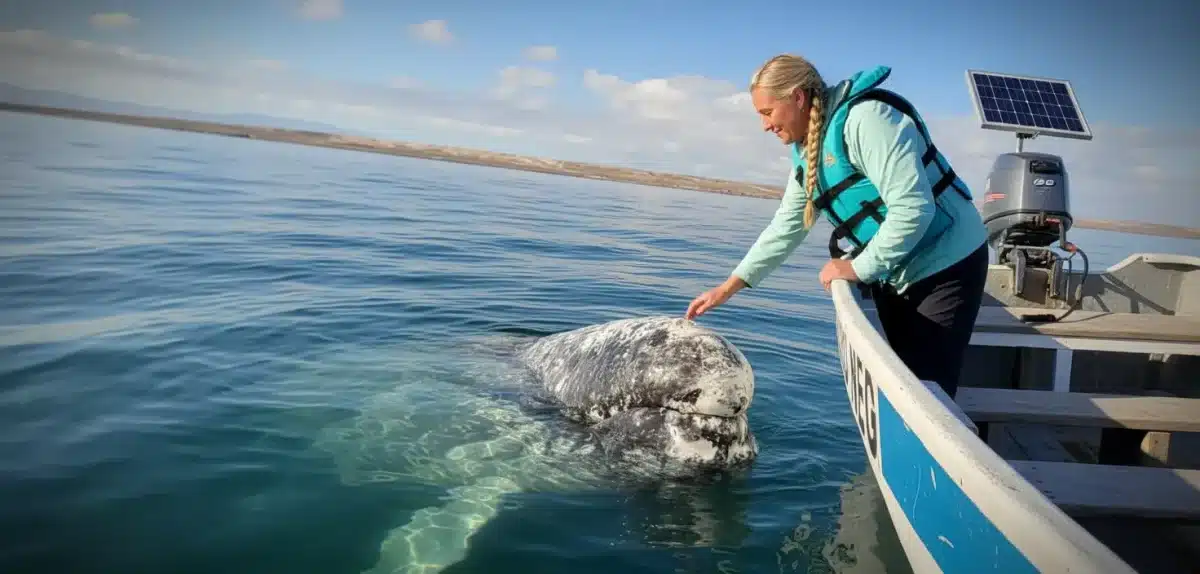The ocean is full of surprises—and sometimes, those surprises knock right on your hull. Let yourself be drawn into the true story of Paco Jimenez Franco, a whale-watching captain on the Pacific coast of Baja California, whose unexpected encounters with whales turned admiration into a profound connection. Spoiler: there are lice, there’s a lot of blubber, and there’s plenty of heart.
When Whales Ask for Help
For over twenty years, Paco Jimenez Franco has captained whale-watching boats in the waters of Ojo de Liebre Lagoon, on the Pacific shoreline of the Baja California peninsula in Mexico. For Paco, every encounter with these marine giants is a true gift. But what began as simple admiration turned into something a great deal more unusual—and moving.
One day, during one of his routine trips, Paco noticed a whale approaching his boat in an atypical, almost deliberate manner. His curiosity piqued, Paco soon spotted the issue: the whale was covered in tiny parasites called whale lice—small creatures that cling to the skin of these ocean giants. No one really knows if these lice cause pain to the whales, but some experts believe that the whales’ habit of leaping out of the water might, among other things, be an attempt to shake the parasites off.
A Simple Gesture, an Unexpected Bond
Suspecting that the whale was seeking help, Paco decided to lend a hand—literally. He gently removed some of the lice from the whale’s skin, and witnessed something unexpected. After he removed the first parasite, the whale returned, positioning itself beside the boat so Paco could continue his task. In his words:
“As soon as I took off the first one, she came right back to let me keep going.”
This simple, touching gesture marked the beginning of a truly unique relationship between Paco and certain whales. From that day on, the same whale—and others—started regularly approaching Paco’s boat, lining up for their own personal cleaning sessions. They come so close that they’ll even lift their heads out of the water, giving the captain access to remove their parasites. Paco explains:
“I’ve done it several times, with this same whale and with others. It’s really exciting for me.”
Rules, Respect—and a Touch of Controversy
While this practice may warm the heart, it’s not without its controversies. In much of the world, it’s strictly prohibited to touch whales. But in selected protected areas along the Baja California coast, these interactions are allowed—on one very important condition: it must always be the whale that makes the first move. That’s exactly what happened here—Paco never forced contact; the whales came to him.
This experience has led Paco to a deeper appreciation for these majestic creatures. He shares:
“By observing their behavior, I’ve learned there’s a nobility about them. They’re amazing.”
This special bond with whales has strengthened his commitment to their preservation and study. Paco considers them intelligent, sensitive beings—worthy of our deepest respect.
He’s now earned himself the unofficial title: ‘privileged whale-cleaner.’ These up-close encounters have allowed him to experience a side of marine life he never could have imagined. Paco’s story is a beautiful reminder that sometimes, humans and nature can interact in respectful, mutually beneficial ways—going far beyond passive observation to a genuine exchange.
Moving Lessons: Comments and Reflections
The story of Paco Jimenez Franco and the whales who ask him for help is a touching example of the unique relationship that can exist between human beings and the natural world. That simple act—removing parasites—becomes a symbol of respect and compassion for marine life. It’s also a lesson, inviting us to see these animals not just as ocean giants, but as sensitive beings, deserving of our care and protection.
Readers echo this sense of awe and reflection:
“I love animals; I would have loved to do what Paco did. All animals were created for us out of love; let’s be good people and take care of them.”
“This story really moved and interested me. Between humans and all creatures there can be help, respect, and compassion. Sometimes it’s people who help animals, and sometimes it’s animals who help people. We can coexist intelligently. Thank you for sharing this touching story.”
“So moving—I hope this serves as a lesson to many. Some animals are smarter than humans and yet we slaughter them for food. Makes you wonder if humans aren’t the real fools of nature.”
“Animals seem to have taken the upper hand, maybe to remind us that humans and nature are one. We all need each other to live.”
“Getting up close to whales is magical. I did it in Mexico in the Sea of Cortez. I hired a boat with a guide in Puerto Lopez Mateo, a small fishing village. Our guide never got closer than 33 feet; we killed the engine and just drifted. None of the whales touched us, but I saw them from about 26 feet away. Their size is so impressive. It’s a once-in-a-lifetime experience.”
“An incredible bond that makes you stop and remember: whales are mammals, much closer to humans than we often think. Hunting them should be absolutely condemned.”
Paco’s journey with the whales reminds us all: sometimes, it’s the simplest acts of kindness that reveal the deepest connections between humanity and the wild world around us.

